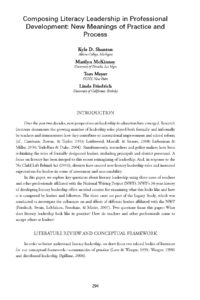Composing Literacy Leadership in Professional Development: New Meanings of Practice and Process
Excerpt
Despite the real constraints on curricular choice and instructional time in the classroom, Melinda advocated that educators attempt to influence the preparation process by contributing, together, what they knew about content and creating their own instructional tools and protocols. This approach reflects her enactment of writing project values and practices that she encountered in her 1987 summer invitational institute: “You start thinking more globally. You just think bigger and broader, and you have a whole different way of thinking about learning. You see yourself as a learner, first and foremost” (Kresge, interview).
Although Melinda viewed her approach as influenced by the NWP, she realized that not all writing project members in her state agreed with her about the content of her work. Instead they advocated resisting standardized curriculum and test preparation. Like Karen, Melinda worked successfully with followers at two levels. Melinda’s collegial approach appeared to overcome the distance between an administrator charged with enforcing an unpopular policy and teachers mandated to meet new requirements. Melinda’s success prompted other regional administrators in the state to call on her, and this outcome has gradually provided an infrastructure of support for school districts across every county-level service region in the state.


